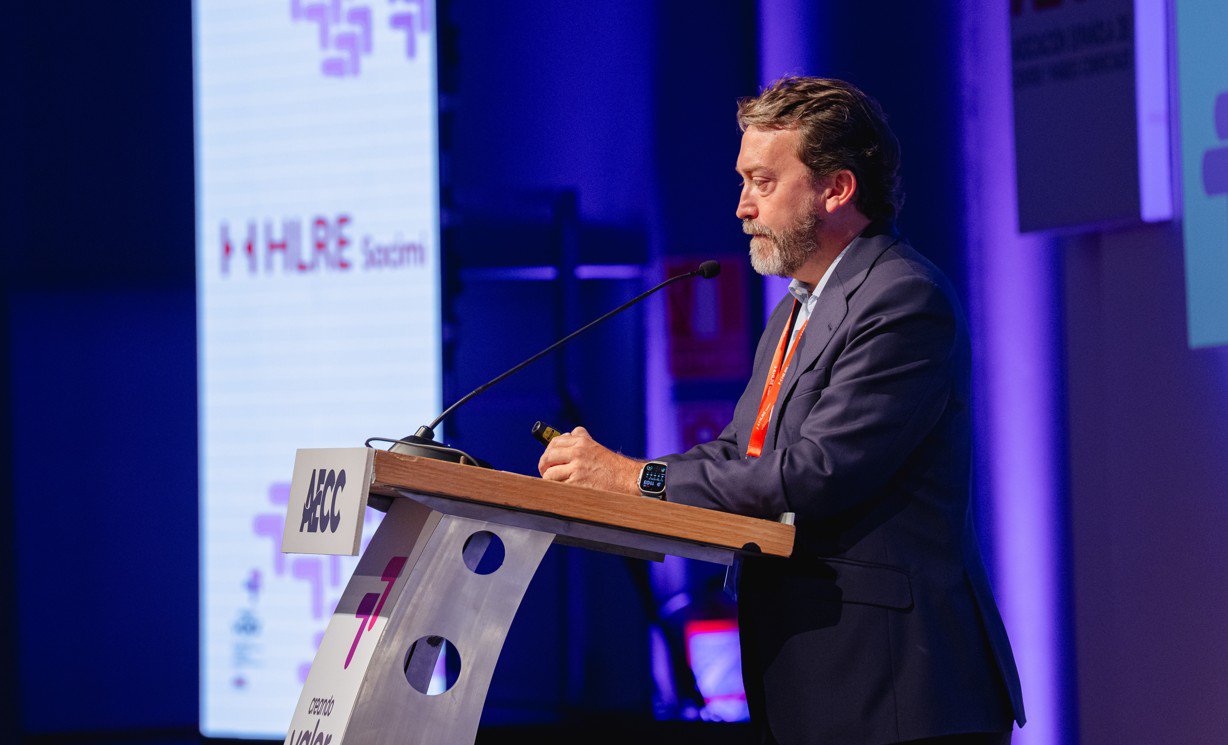Economic challenges in today’s context of such a level of uncertainty were the main theme of the presentation by Ignacio de la Torre, Chief Economist at Arcano Partners, during the AECC Congress. The conference was sponsored by HLRE Socimi.
How would you describe Spain's current economic situation compared to the European and global environment?
Ignacio de la Torre: In 2025, Spain is in a positive situation, growing above the eurozone and the United States. The increase is diversified, based not only on consumption but also on investment, construction, tourism and non-tourism service exports.
What are the main macroeconomic factors influencing consumption in Spain in 2025? How is it affected by inflation and interest rate policy?
I.T: Unemployment is at levels not seen since 2008 and wages are growing above inflation. These are key elements in understanding the evolution of consumption. Lower interest rates also help, although they are more important in the purchase of homes.
Regarding employment and income trends, does the growth in the ‘quantity’ of people making up the working population translate into a substantial improvement for the retail sector?
I.T: The increase in employment is a positive factor for the retail sector, as it implies a larger potential customer base. The problem with higher growth in terms of quantity is that, although the figures for Spain as a whole are very positive, if we analyse them on a per capita basis, the figures are much more moderate.
What specific risks do you see in 2025 for consumption and trade due to international tension?
I.T: Consumer spending depends on consumer confidence in the economic situation. The consumer confidence index is currently at historically average levels, since recovering from the impact of COVID-19 and the war in Ukraine. In terms of future risks to consumption, these stem mainly from external shocks. A possible sovereign debt crisis in the US or France that spreads to other countries, or a general deterioration in confidence if Trump attacks Europe again with tariffs or if Russia's belligerent attitude increases uncertainty substantially. At the moment, we consider this to be a limited but growing risk.
Do you see any structural changes in Spanish retail supply chains driven by the current geopolitical situation?
I.T: In a context in which the US continues to limit the arrival of Chinese products, this production may be relocated to Europe, flooding the European market with products and, therefore, lowering prices.
Which markets and segments could be most affected by an international escalation?
I.T: The energy sector has shown remarkable moderation in recent years, despite tensions in Ukraine and Gaza. In the context of a possible truce in Ukraine, we could even observe moderation in gas prices. We do not see excessive inflationary pressures in Europe, but rather quite the contrary, given the modest level of growth.
Is the resilience of Spanish retail based more on operational innovation, the quality of economic growth, or the strength of domestic consumption?
I.T: I understand that it is a combination of all three elements. Retail is a competitive sector that is benefiting from the domestic economic boom, along with the positive evolution of tourism, which continues to reach new historic highs year after year.
“Spain's exposure to US tariffs is lower than that of
the rest of Europe, making it less vulnerable”
How can Artificial Intelligence become an engine of growth in a context of low growth potential? How do you think AI will transform a sector such as retail?
I.T: AI can improve the customer experience and optimise internal management. It allows for personalised recommendations and the use of chatbots offering continuous customer service, increasing sales and loyalty. In operations, AI accurately predicts demand, optimises inventories and improves the supply chain, reducing costs. It also drives dynamic pricing, adjusting prices based on competition and demand. Finally, elements such as agents can be a game changer for the sector.
What message would you convey to asset managers and shopping centre operators about how to navigate uncertainty in 2025?
I.T: Growth in Spain will continue to be sustainable and risks will be limited. This scenario is based on positive developments in consumption and investment, supported by reasonable interest rates; on tourism, which, despite experiencing some moderation, will continue to contribute to significant growth; on exports of goods, favoured by the expected recovery in Europe; and on exports of non-tourism services, which will maintain the positive trend observed in recent years. In addition, although they will not create excessive momentum, European funds will contribute to grow. The tariff risk is not material and the good performance of the public deficit in 2025 will not be a significant hindrance to future growth, as no drastic correction is necessary.
Is Spain better prepared than other European countries to face future economic and geopolitical shocks?
I.T: Spain's exposure to US tariffs is lower than that of the rest of Europe, making it less vulnerable. The economy is in fairly good shape, with private debt at very reasonable levels and a notable external surplus. This means that Spain exports more capital to the rest of the world than it receives, and it reflects the fact that the economy is growing whilst saving, thanks to the private sector, which contributes to the sustainability of growth. At a geopolitical level, the war in the Middle East is forcing a redirection of tourism, benefiting some Mediterranean countries, including Spain, as was the case during the Arab Spring.



